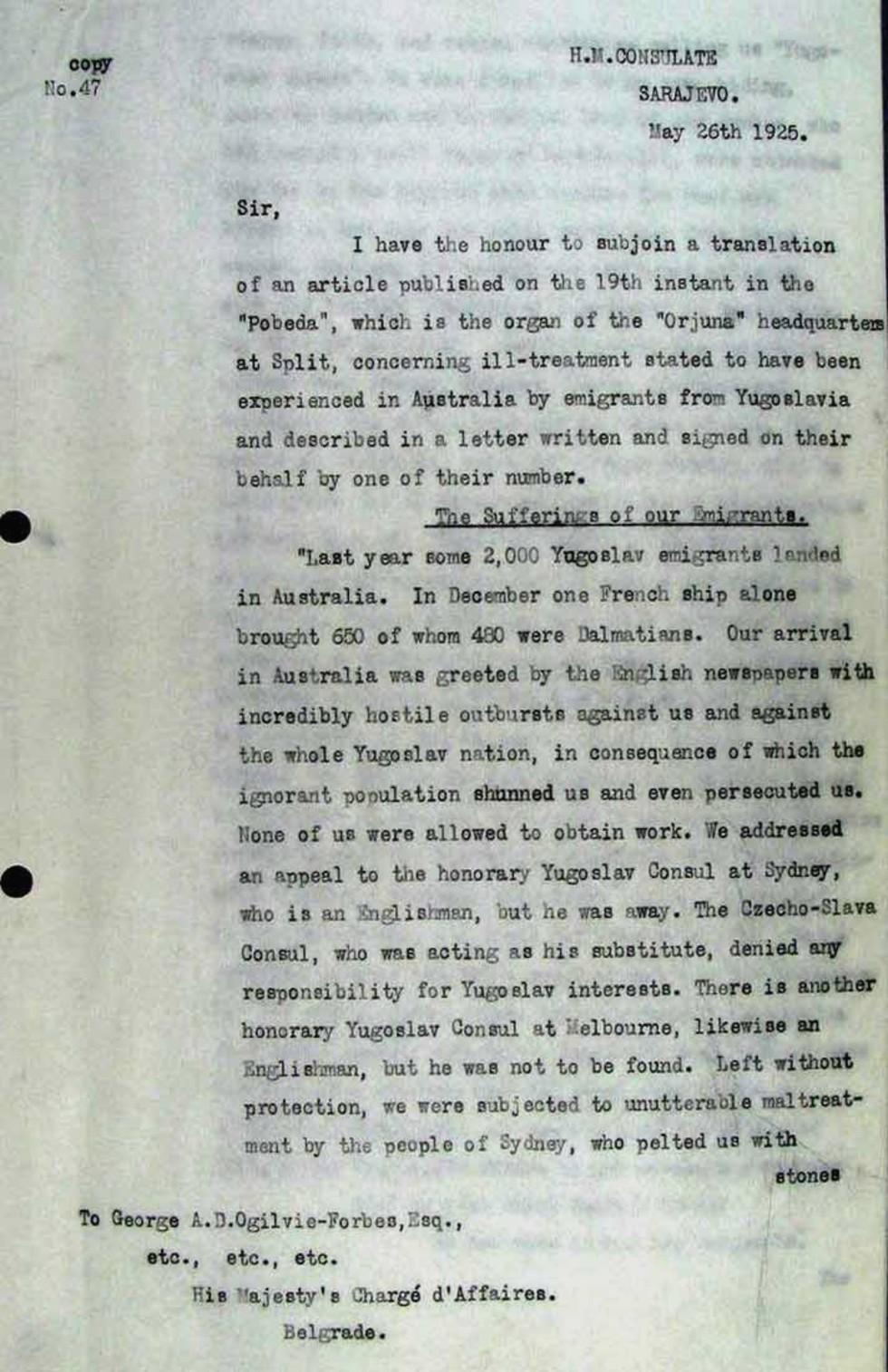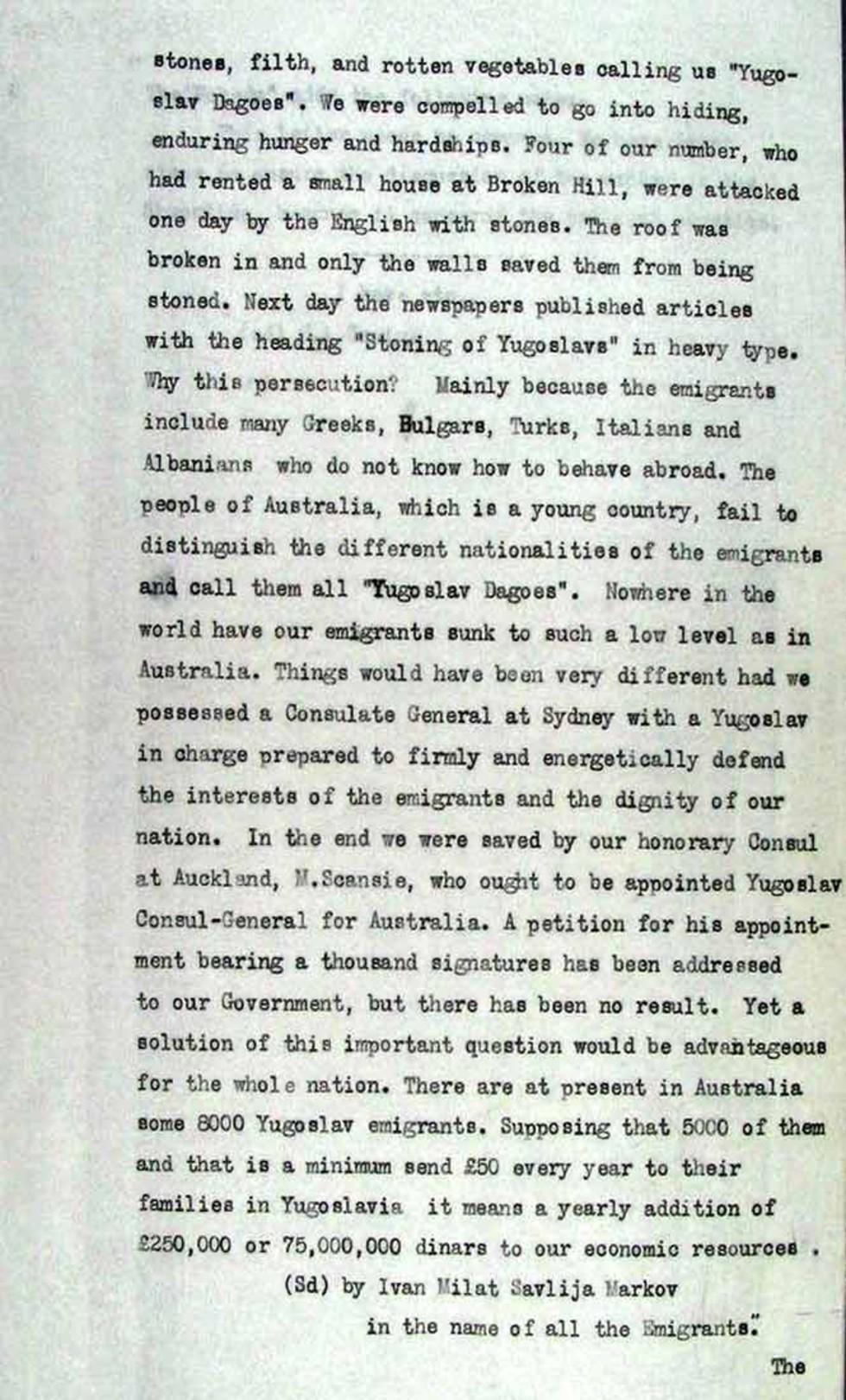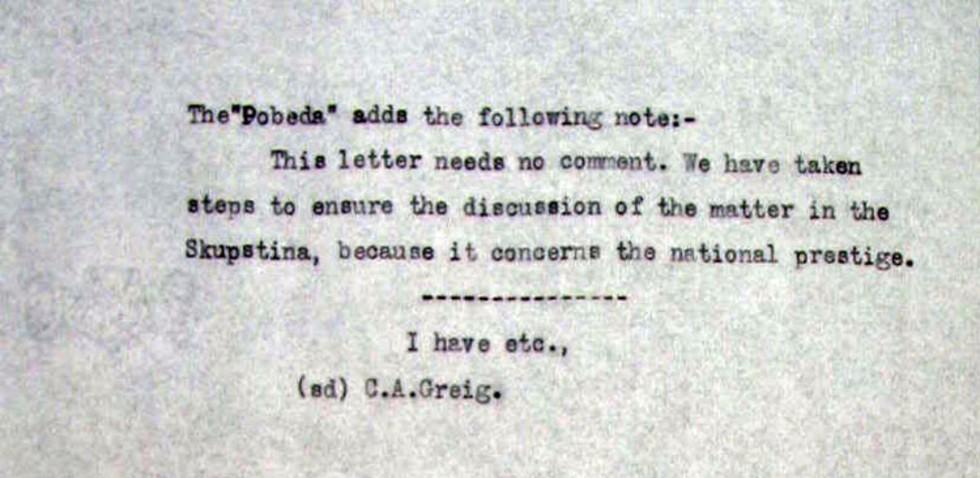
A copy of a newspaper article from former Yugoslavia.

A copy of a newspaper article from former Yugoslavia.

A copy of a newspaper article from former Yugoslavia.
Aboriginal and Torres Strait Islander people should be aware that the National Archives' website and collection contain the names, images and voices of people who have died.
Some records include terms and views that are not appropriate today. They reflect the period in which they were created and are not the views of the National Archives.


A copy of a newspaper article from former Yugoslavia.

A copy of a newspaper article from former Yugoslavia.

A copy of a newspaper article from former Yugoslavia.
[Page 1.]
copy
No. 47
H.M. CONSULATE
SARAJEVO.
May 26th 1925.
Sir,
I have the honour to subjoin a translation of an article published on the 19th instant in the “Pobeda”, which is the organ of the “Orjuna” headquarters at Split, concerning ill-treatment stated to have been experienced in Australia by emigrants from Yugoslavia and described in a letter written and signed on their behalf by one of their number.
[Underlined heading:] The Sufferings of our Emigrants.
“Last year some 2,000 Yugoslav emigrants landed in Australia. In December one French ship alone brought 650 of whom 480 were Dalmatians. Our arrival in Australia was greeted by the English newspapers with incredibly hostile outbursts against us and against the whole Yugoslav nation, in consequence of which the ignorant population shunned us and even persecuted us. None of us were allowed to obtain work. We addressed an appeal to the honorary Yugoslav Consul at Sydney, who is an Englishman, but he was away. The Czecho-Slava Consul, who was acting as his substitute, denied any responsibility for Yugoslav interests. There is another honorary Yugoslav Consul at Melbourne, likewise an Englishman, but he was not to be found. Left without protection, we were subjected to unutterable maltreatment by the people of Sydney, who pelted us with stones
[Addressed:] To George A.D. Ogilvie-Forbes, Esq.,
etc., etc., etc.
His Majesty’s Chargé d’Affaires.
Belgrade.
[Page 2.]
stones, filth, and rotten vegetables, calling us “Yugoslav Dagoes”. We were compelled to go into hiding, enduring hunger and hardships. Four of our number, who had rented a small house at Broken Hill, were attacked one day by the English with stones. The roof was broken in and only the walls saved them from being stoned. Next day the newspapers published articles with the heading “Stoning of Yugoslavs” in heavy type. Why this persecution? Mainly because the emigrants include many Greeks, Bulgars, Turks, Italians and Albanians who do not know how to behave abroad. The people of Australia, which is a young country, fail to distinguish the different nationalities of the emigrants and call them all “Yugoslav Dagoes”. Nowhere in the world have our emigrants sunk to such a low level as in Australia. Things would have been very different had we possessed a Consulate General at Sydney with a Yugoslav in charge prepared to firmly and energetically defend the interests of the emigrants and dignity of our nation. In the end we were saved by our honorary Consul at Auckland, M. Scansie, who ought to be appointed Yugoslav Consul-General for Australia. A petition for his appointment bearing a thousand signatures has been addressed to our Government, but there has been no result. Yet a solution of this important question would be advantageous for the whole nation. There are at present in Australia some 8000 Yugoslav emigrants. Supposing that 5000 of them and that is a minimum send £50 every year to their families in Yugoslavia it means a yearly addition of £250,000 or 75,000,000 dinars to our economic resources.
(Sd) by Ivan Milat Savlija Markov
in the name of all the Emigrants”.
[Page 3.]
The “Pobeda” adds the following note:-
This letter needs no comment. We have taken steps to ensure the discussion of the matter in the Skupstina, because it concerns the national prestige.
[Dividing line.]
I have etc.,
(sd) C.A. Greig.
Learn how to interpret primary sources, use our collection and more.
